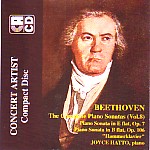[Editor’s Note: In the wake of the late-breaking scandal concerning the provenance of Joyce Hatto’s recordings, we had the option of removing all Hatto reviews, or leaving them intact and identifying the correct artists, to the extent possible, as we learn them. We have elected the latter, both as a caution and as a way to do some justice to the real artists as we learn their identities. So enjoy the review, but please refrain from purchasing this disc until we know who should get proper credit for it. DH]
Volume 8 of Joyce Hatto’s complete Beethoven piano sonata cycle couples the composer’s two largest works in the genre. Time and again, Hatto’s Hammerklavier evokes a sonically updated version of the suave, symmetrical, and classically poised 1952 Solomon recording. The nervous energy and combative dynamic contrasts I miss in Hatto’s exceedingly well played first movement are ever present in the Scherzo. Hatto’s superb legato articulation allows her to follow the Adagio sostenuto’s long lines through to their final destinations while helping to sustain the intimate, lyrical reserve she favors. While faster, angular, more combative and exhaustively-voiced final Fugues can be had (Peter Serkin and Charles Rosen, for example), Hatto’s supple fingerwork achieves the kind of clarity and transparency that should give better-known Hammerklavier practitioners pause.
However, Hatto’s Op. 7 is an incredible piece of work, unquestionably deserving a place among this sonata’s reference recordings. She matches Kempff’s genius for tone color and prodigious dynamic differentiation bar for bar while conveying much more of the first movement’s rollicking wit and brio. Detached and sustained phrases always emerge with characterful distinction. Inner counterpoints and bass lines are always alive and specifically voiced, yet without the slightest air of calculation or fuss. Hatto takes the finale’s taxing left-hand rotary patterns in effortless stride, and toward the end she makes something quite magical of the main theme’s temporary detour from E-flat major to E major. To sum up, Hatto’s Hammerklavier is excellent, but her Op. 7 is quite special.
































